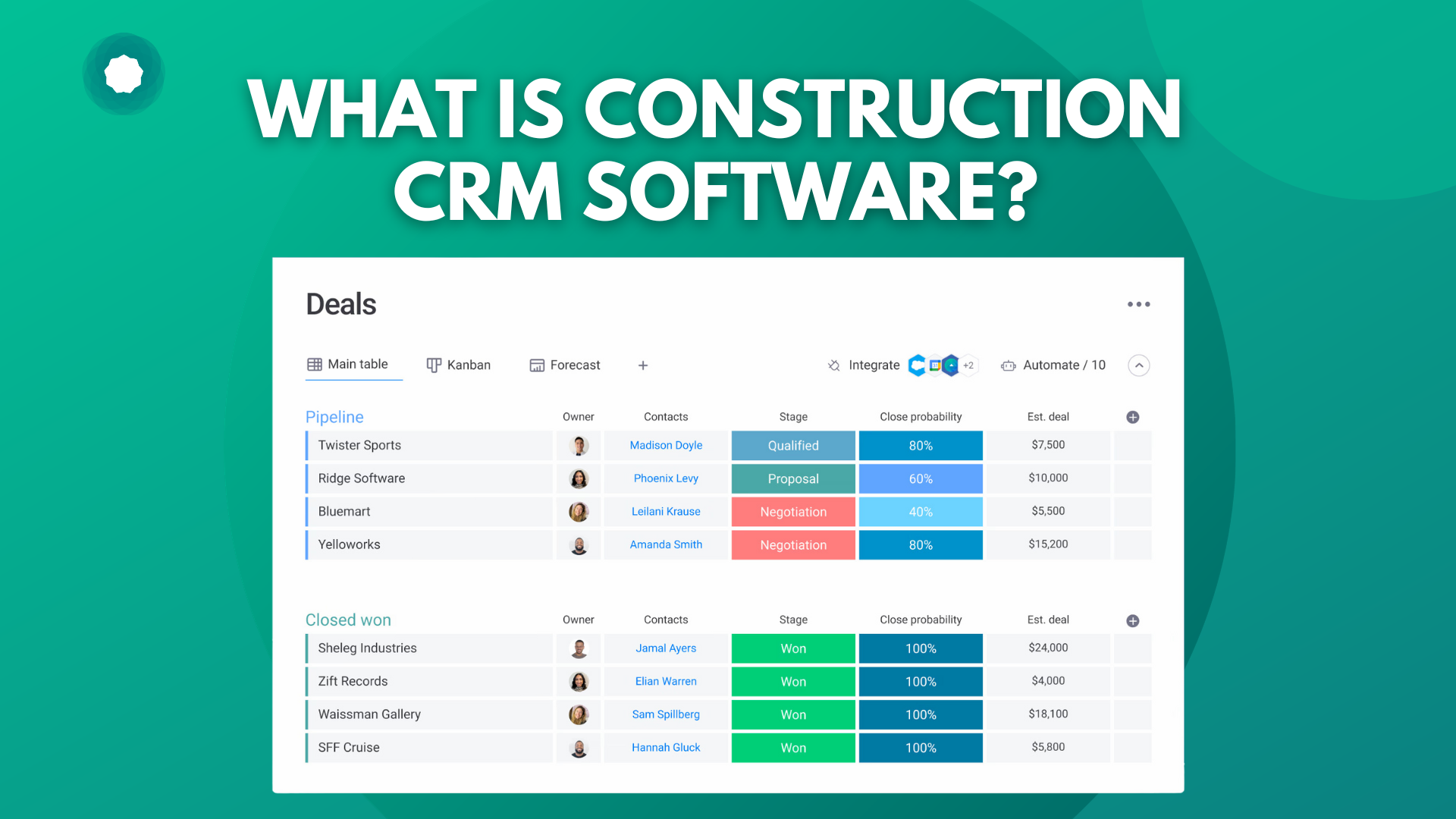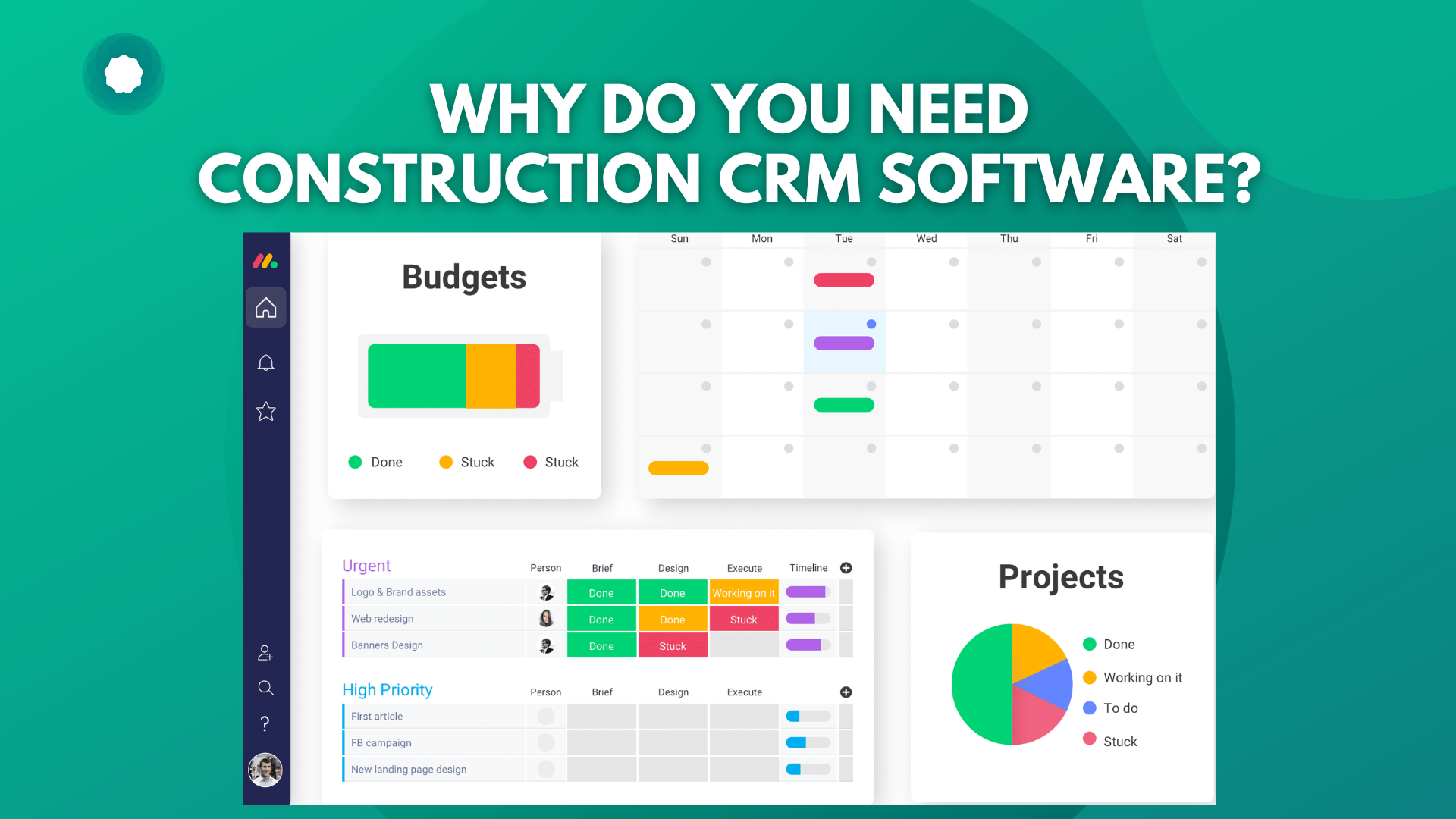
The construction industry is known for its complexity and fast-paced nature.
It can be hard to stay organized and keep things running smoothly when you have many projects, tight deadlines, and lots of people involved.
This is where construction CRM software comes in.
CRM software can be very helpful in the construction industry. It can make your work processes better.
What is Construction CRM Software?

Construction CRM software
Construction CRM software is a specialized customer relationship management (CRM) tool designed specifically for the construction industry.
It helps construction companies manage their interactions with clients, contractors, suppliers, and other stakeholders.
The software allows construction businesses to track leads, manage projects, and maintain relationships with clients and partners.
It also provides valuable insights and analytics to help businesses make data-driven decisions.
Why Do You Need Construction CRM Software?

Improved Project Management
One of the biggest challenges in the construction industry is managing multiple projects simultaneously.
With CRM software, you can track the progress of each project, assign tasks to team members, and set deadlines.
This helps ensure that projects are completed on time and within budget.
Better Communication and Collaboration
Effective communication and collaboration play pivotal roles in the success of every construction project.
CRM software stores all project information in one place so everyone on the team can easily access it.
This stops the need for a lot of back-and-forth talk and makes sure everyone knows what's happening.
Streamlined Sales Process
CRM software can help streamline the sales process for construction companies.
It allows businesses to track leads, manage proposals, and monitor the progress of each deal. This helps businesses identify areas for improvement and make data-driven decisions to close more deals.
Enhanced Customer Relationships
Maintaining strong relationships with clients is crucial for the success of any construction business.
CRM software allows businesses to track all interactions with clients, including emails, calls, and meetings. This helps businesses provide personalized and timely communication, leading to better customer satisfaction and retention.
Improved Data Management and Analysis
CRM software provides construction businesses with valuable insights and analytics.
This helps businesses make data-driven decisions and identify areas for improvement. With the ability to track and analyze data, businesses can optimize their processes and improve overall efficiency.
How to Choose the Right Construction CRM Software?

When choosing a construction CRM software, there are a few key factors to consider:
- Industry-Specific Features
Not all CRM software is created equal.
Look for a software designed for construction companies.
It should have features like project management, lead tracking, and customer relationship management.
- Integration with Other Tools
Construction businesses often use a variety of tools and software to manage their operations.
Find a CRM software that works with other tools you use, like accounting software or project management tools.
This will help streamline your processes and avoid duplicate data entry.
- User-Friendly Interface
The last thing you want is to invest in a CRM software that is difficult to use and requires extensive training.
Look for a software with a user-friendly interface that is easy to navigate and requires minimal training.
- Personalization Options
Every construction business is unique, and your CRM software should be able to adapt to your specific needs.
Look for a software that offers Personalization options, such as the ability to create custom fields and workflows.
Real-World Examples of Construction CRM Software in Action

Construction CRM dashboard
One example of a construction CRM software in action is Procore.
This software offers a variety of features, including project management, document management, and financial management.
It also integrates with other tools commonly used in the construction industry, such as QuickBooks and Microsoft Excel.
Another example is Buildertrend, which offers features such as lead tracking, project management, and customer relationship management.
Additionally, the software offers a personalization interface to cater to the specific needs of each construction company.
How to Implement Construction CRM Software in Your Business?

Construction CRM implementation
Implementing a new software can be a daunting task, but with the right approach, it can be a smooth and successful process.
Here are some steps to follow when implementing personalization CRM software in your business:
Identify Your Goals and Objectives
Before implementing any new software, it is important to identify your goals and objectives.
What do you want to achieve with the software? What specific problems are you trying to solve?
This will help you choose the right software and set realistic expectations.
Train Your Team
Proper training is crucial for the successful implementation of any new software.
Make sure to provide your team with the necessary training and resources to use the software effectively.
This will help ensure a smooth transition and minimize any disruptions to your business operations.
Start Small and Scale Up
It can be tempting to implement all the features of your new CRM software at once, but this can be overwhelming for your team.
Start with the most critical features and gradually add more as your team becomes comfortable with the software.
Monitor and Evaluate
Once your CRM software is up and running, it is important to monitor and evaluate its performance.
Are you achieving your goals? Are there any areas for improvement?
Regularly reviewing and analyzing data will help you make informed decisions and optimize your processes.
In conclusion, CRM software is an essential tool for construction technology businesses seeking to streamline operations and boost efficiency.
Companies can use tools to help them reach their goals and do better than their competitors.
When selecting a construction CRM software, it is crucial to consider industry-specific features, integration options, and personalization capabilities.
Additionally, a successful transition requires proper training and a gradual implementation process.
By making an informed choice regarding CRM software, construction businesses can elevate their performance and unlock greater success.
CJPath CRM is a strong player in the market.
It provides a complete set of tools and services that are specially made for the construction industry.
Its robust features and seamless integration capabilities make it a valuable asset for businesses aiming to streamline operations and enhance customer relationships.
Choosing the best CRM software is an important decision that can help your construction business succeed
